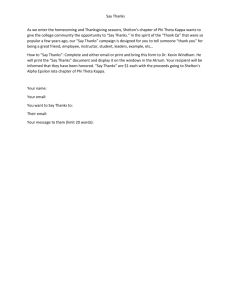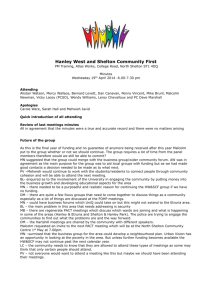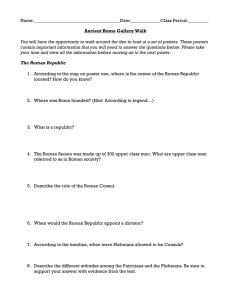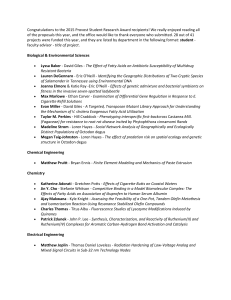History 203 The Rise and Fall of Rome Spring, 2004 REQUIRED
advertisement
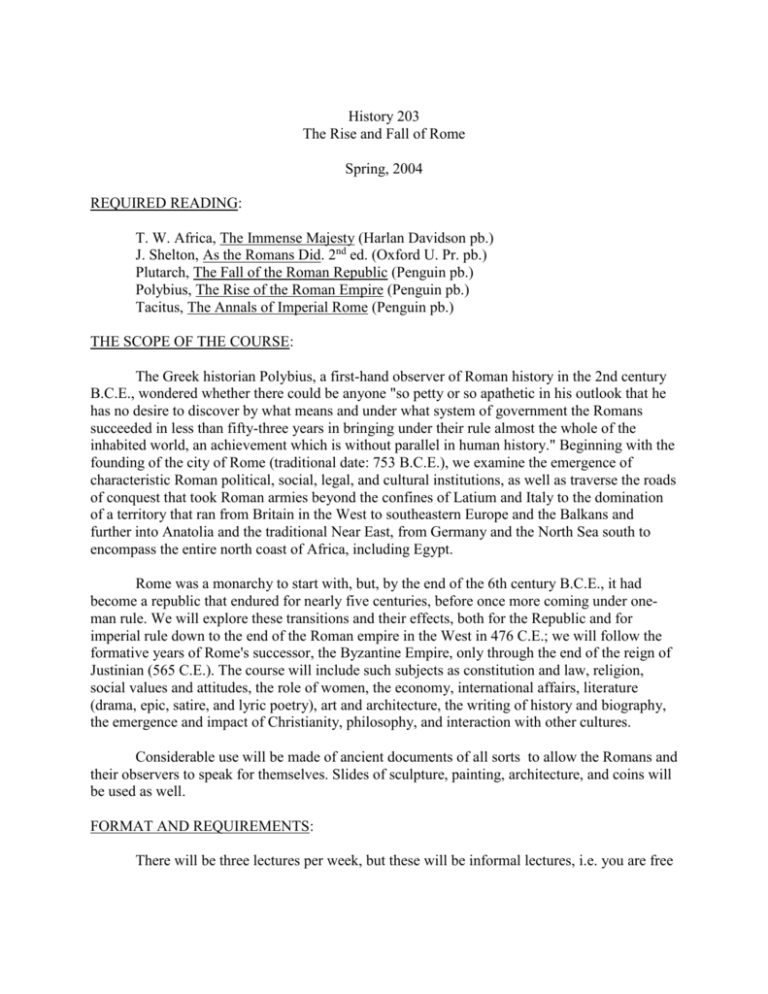
History 203 The Rise and Fall of Rome Spring, 2004 REQUIRED READING: T. W. Africa, The Immense Majesty (Harlan Davidson pb.) J. Shelton, As the Romans Did. 2nd ed. (Oxford U. Pr. pb.) Plutarch, The Fall of the Roman Republic (Penguin pb.) Polybius, The Rise of the Roman Empire (Penguin pb.) Tacitus, The Annals of Imperial Rome (Penguin pb.) THE SCOPE OF THE COURSE: The Greek historian Polybius, a first-hand observer of Roman history in the 2nd century B.C.E., wondered whether there could be anyone "so petty or so apathetic in his outlook that he has no desire to discover by what means and under what system of government the Romans succeeded in less than fifty-three years in bringing under their rule almost the whole of the inhabited world, an achievement which is without parallel in human history." Beginning with the founding of the city of Rome (traditional date: 753 B.C.E.), we examine the emergence of characteristic Roman political, social, legal, and cultural institutions, as well as traverse the roads of conquest that took Roman armies beyond the confines of Latium and Italy to the domination of a territory that ran from Britain in the West to southeastern Europe and the Balkans and further into Anatolia and the traditional Near East, from Germany and the North Sea south to encompass the entire north coast of Africa, including Egypt. Rome was a monarchy to start with, but, by the end of the 6th century B.C.E., it had become a republic that endured for nearly five centuries, before once more coming under oneman rule. We will explore these transitions and their effects, both for the Republic and for imperial rule down to the end of the Roman empire in the West in 476 C.E.; we will follow the formative years of Rome's successor, the Byzantine Empire, only through the end of the reign of Justinian (565 C.E.). The course will include such subjects as constitution and law, religion, social values and attitudes, the role of women, the economy, international affairs, literature (drama, epic, satire, and lyric poetry), art and architecture, the writing of history and biography, the emergence and impact of Christianity, philosophy, and interaction with other cultures. Considerable use will be made of ancient documents of all sorts to allow the Romans and their observers to speak for themselves. Slides of sculpture, painting, architecture, and coins will be used as well. FORMAT AND REQUIREMENTS: There will be three lectures per week, but these will be informal lectures, i.e. you are free to interrupt, in a civil manner, for questions, clarifications, amplifications, etc. We will discuss some issues and documents. There will be two examinations: (1) an in-class mid-term examination on which you will be expected to write an essay on one of three or four questions; (2) a final examination, on which you will write two essays on topics for which you will also have a choice. The grades on the final will not be averaged together; you will, therefore, have three grades, of equal weight, on which the final grade will be based. There will be no papers assigned for this course, nor will it be possible to write a paper for additional credit or in lieu of an exam. It will fall to you to read the assigned materials carefully and take good notes on both the reading and the lectures. To get a high grade, mastery of the course materials will have to be demonstrated; that involves the learning of both the basic facts and their interpretation, i.e. description and explanation. The lectures will be of considerable importance, since I will disagree with or extensively augment the materials in the readings. While I do not put undue stress on dates and names, it is difficult to comprehend the past without learning some key dates and the names of major historical figures. You will be expected to be able to place these major figures and events in a chronological context. Likewise, you will be expected to learn some basic Roman terminology. COMPORTMENT AND ATTENDANCE: I expect your full attention during the class. That means no reading of materials for other courses, newspapers, love letters, etc. and no chit-chat. Most important, if you know that you must leave before the end of the hour, please come up and tell me before the class starts; I find it distracting in the extreme to have people suddenly get up and leave for no apparent reason. An emergency is, of course, another matter. Sleep on your own time, i.e. not in class. If you must miss a class, you will be well-advised to get the notes from someone who was present; as noted above, I will be introducing materials not covered in the assigned readings and some interpretations that differ from those in the textbook. If you are inclined to attend class only sporadically, you probably ought to consider some other course; you are unlikely to do well in this one. GETTING HELP: The teaching assistant this semester is a doctoral candidate in history. Both of us will be available during our office hours (see end of syllabus) to answer questions, help you understand the material, and in general offer any assistance we can to help you learn the material. Please take advantage of the opportunity; you will find us eager to help. If you are in doubt, ask! Appointments can be made for those whose schedules conflict with our office hours. SCHEDULE OF CLASSES AND READINGS This is an approximate guide to the sequence of topics and readings. It may prove necessary to expand or contract the treatment of certain topics as we go along. While the readings in Africa and in Shelton are not lengthy, those in Polybius, Plutarch, and Tacitus, are; it would be wise to start reading and taking notes on these works well ahead of the classes for which they are assigned. Read Sheltons’ introductions to the individual documents. Jan. 21: Introduction to the Course Jan. 23: How do We know About Ancient Rome? READ: Polybius, pp. 9-36; Plutarch, pp. 7-10; Shelton, xxiii-xxv, 440-51. Jan. 26: Geography & Peoples of Italy READ: Africa, 1-36. Familiarize yourselves with the maps in Shelton, 434-35. Jan. 28: Roman Memories: Founders, Kings, and Liberty READ: Africa, 37-49; Shelton, 1-3 (incl. Doc. 1), Docs. #s 7, 15, 234, 423, 428. Jan. 30: The Early Republic, I: Rome Against Italy READ: Africa, 49-50, 54-60. Feb. 2: The Early Republic, II: The Emerging Roman Polity READ: Africa, 50-54, 60-66; Polybius, Book VI; Shelton, Docs. #s 251-53, 25658, pp. 203-05. Feb. 4: The Early Republic, III: Society, Religion, Values READ: Africa, 67-99; Shelton, pp. 4-8; Doc. #2; pp. 11-12; Doc. #8; pp. 16-17; Doc. #15; p. 47, Doc. #66; pp. 203-05; Docs. #s 251-53, 255-58, 355, 406, 408, 416, 418-19, 423, 426-28. Feb. 6: The Middle Republic: The Path to Empire, I: First Carthage READ: Africa, 100-28; Polybius: pp. 41-112, 123-24, 147-276, 297-301, 358-63, 369-94, 399-428, 452-82; Shelton, p. 137 (bottom); Docs. #s 134, 175, 179-80; p. 163, Doc. # 198; pp. 268-70; Docs. #s 291-92, 317, 335, 352, 409, 434. Feb. 9: The Path to Empire, II: Then the Greek World READ: Africa, 129-39; Polybius, pp. 494-541; Shelton, Docs. #s 291-92, 415, 435-37. Feb. 11: The Price of Empire READ: Africa, 139-54; Shelton, Docs. #s 134,163 (last par.), 164, 175-76, 180, 187-88, 191, 207-09 318, 207, 209, 219, 404, 414, 420, 456; pp. 148-50. Feb. 13: The Late Republic: The Gracchi: Strains in the Body Politic READ: Africa, 154-61; p. 193 (top par.); Shelton, pp. 152-54, Docs. #s 187, 265, 333. Feb. 16: Marius and Sulla: Generals to the Left and Right READ: Africa, 161-71; Plutarch: Gaius Marius, Sulla. Feb. 18: From Sulla to Catiline: The Cracks Widen READ: Africa, 172-83; Plutarch: Crassus, §§ 1-13; Pompey, §§ 1-46; Cicero, §§ 1-23; Caesar, §§ 1-8. Shelton, Docs. #s 177, 238, 266, 321, 334. Feb. 20,23: Caesar Buries the Republic; Antony Buries Caesar READ: Africa, 183-197; Plutarch: Crassus, §§ 14-33; Pompey, §§ 47-80; Caesar, 9-69; Cicero, §§ 24-49; Shelton, Docs. #s 2, 229, 253-55, 259, 262, 265-66, 272, 293, 318-20. Feb.25, 27: Society in the Roman Republic READ: Shelton, Docs. #s: 8, 18, 25, 29, 48, 54, 69-70, 76, 82, 109, 124-25, 128, 163, 171, 183-84, 191-92, 194, 208, 227, 238, 261, 326, 334-35, 345, 377, 39697. Mar.1, 3: The Golden Age of Roman Culture READ: Africa, 208-17; Shelton, Docs. #s 56, 75, 272, 326, 360, 407, 438, 460-65. Mar. 5: ********* MID-TERM EXAMINATION ********* Mar. 8: Augustus and the Creation of the Principate READ: Africa, 197-207; Shelton, Docs. #s 267, 275-76. Mar. 10: Augustus: Man and Ruler READ: Africa, 218-26; Tacitus, §§ 31-42; Shelton, Docs. #s 38-40, 77-78 (including the genealogical charts on pp. 56-57), 268, 330. Mar. 15: Historians of the Roman Empire READ: Tacitus, pp. 7-27; Africa, pp. 108, 173, 218-20, 222, 230, 233, 236-37, 259-61, 264, 266, 269-71, 284, 288, 315, 286, 359, 367-69; Shelton, pp. 440-50; Docs. #s 334, 175-, 179-80, 292, 335, 415-16, 434-35, 437, 7, 232, 419, 426, 428, 276, 66, 333, 19, 323-34, 39, 267, 134, 176, 423, 39. Mar. 17, 19: Tiberius, the Sullen Caesar READ: Africa, 226-28; Tacitus, 38-227; Shelton, Docs. #s 429, 431, 442. Mar. 22: Caligula, Claudius, Nero, and the Year of the Four Emperors READ: Africa, 228-35; Tacitus, 231-397; Shelton, Docs. #s 222, 378, 445. Mar. 24: The Flavian Dynasty READ: Africa, 235-38. Mar. 26,29: The "Golden Age" of Rome: “The Good Emperors” READ: Africa, 238-62; Shelton, Docs. #s 90, 269-70, 288, 322, 379, 233, 305, 315, 91, 20, 193, 367. Mar. 31Apr.16: The Society and Culture of the Principate READ: Africa, 262-83, 403-08; Shelton, Docs. #s 54-55, 57-66, 68, 71, 73-4, 77-78, 16-17, 19-24, 26-28, 30-47, 52-3, 325, 327, 329-32, 336-44, 99-108, 110-23, 126-27, 130-33, 135, 137-52, 154-58, 161-62, 165-67, 169-70, 172-74, 181-82, 185-86, 189-93, 195-97, 199-206, 210-18, 220-26, 228, 231, 233-50, 7998, 348-59, 361-76, 378, 382-88, 390-95, 398-400, pp. 359-62; 402-03, 406, 41013, 417, 421-22, 424-25, 427, 429-32. Apr. 19: Roman Art & Architecture READ: Look at plates in Africa. Apr. 21: Coins as Evidence for Roman History READ: Africa, pls. on pp. 111, 193, 196, 232. Apr. 23: Severans and Soldiers READ: Africa, 284-98. Apr. 26: Autocracy's Reign: Diocletian to Constantine READ: Africa, 298-324; Shelton, Doc. #168. Apr. 28: Christian Beginnings READ: Africa, 325-46; Shelton, Docs. #s 440-43, 445. Apr. 30: The Trials and Triumph of Christianity READ: Africa, 346-357; Shelton, Docs. #s. 446-48, 440, 449-52, 454-55, 457-59, 466-73. May 3: The End of the Western Roman Empire READ: Africa, 358-88. May 6: The Aftermath and Survival in the East READ: Africa, 388-401. May 7: Law: Rome's Abiding Legacy READ: Shelton, Docs. #s 3-6, 277-90, 426, 225-26, 317, 251, 253, 155, 153, 162, 186. History 203 is a 4-credit course. Instructor: Professor G. E. Kadish Office: LT 609 Phone: x2488 E-mail: kadishg@binghamton.edu Office hours: M: 1:10-2:10; W: 3:30-4:30, Th: 9:00-10:00 and by appointment TA: Ms. Mira Kofkin Office: LT Office hours:
